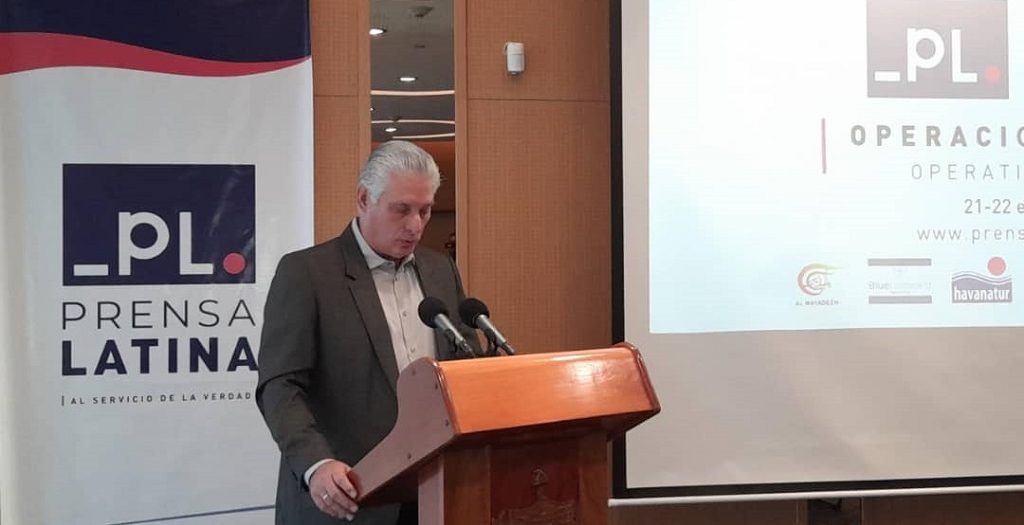On the opening day of the New Operation Truth Forum held in Havana, organized by Prensa Latina News Agency, the Cuban leader thanked participants from over 30 nations for their attendance to the event.
Díaz-Canel stressed that celebrating this forum is of special significance because it takes up the original Operation Truth, conducted in 1959 at the call of the historic leader of the Cuban Revolution, Fidel Castro, to refute the smear campaigns against the newly-formed social project.
Plus, he said, because the meeting is being called by the prestigious Prensa Latina, which has accompanied the Cuban government for 65 years.
“Welcome to Havana, comrades in arms,” Díaz-Canel said.
He expressed his gratitude because in these alternative trenches the voice of Cuba is heard loudly and the inclusion of Cuba in the unilateral States Sponsor of Terrorism (SSOT) list, the tightening of the US blockade and the disinformation campaigns are being fought.
Operation Truth, he said, is a challenge for these times of media terrorism and defamation.
Díaz-Canel emphasized the need to make more and better political communication so that the people and the world understand the socio-economic transformations implemented by the country on the road to a more prosperous and just society.
Prensa Latina reaffirms commitment to truth 65 years later
In the same way as more than six decades ago, the world can trust nowadays in the commitment to truth assumed by the Prensa Latina news agency, said its President Luis Enrique González.
In his welcoming remarks to the International Forum New Operation Truth, which commemorates the days held in January 1959 to disseminate the reality of the newly-formed Cuban Revolution, Luis Enrique González praised the need for an inclusive, humanist and dignified journalism.
“Sixty-five years ago, Cuba faced the onslaught of a media hype seeking to put an end to the dream of freedom. The historic leader of the Cuban Revolution Fidel Castro Ruz called nearly 400 journalists from around the world in the midst of the smear campaign he called the most infamous, criminal and unjust launched against any people,” Luis Enrique González recalled.
That was the genesis, three months later, of Prensa Latina, the first and most important alternative media in the region to date, said González.
Its value, he said, is linked to the pressing need to speak with its own voice, as a pioneer and school of the struggle from the Global South against disinformation, manipulation and fake news.
In this regard, Prensa Latina president evoked Fidel when in 1999 he said that the News Agency “emerged as a beacon of truth and an independent and proper voice of Our America in a world increasingly dominated by the Western and, above all, North American media outlets”.
Thanks to its success in breaking the hegemonic information models, Prensa Latina was seen as a threat by the CIA and FBI, and came to be considered “the most effective – and, from the U.S. standpoint, the most dangerous – Cuban propaganda weapon”.
In spite of the attempts to silence its voice, González added, Prensa Latina is being consolidated as the major media based in Cuba, with more than 350 daily news, 18 own and third-party publications, Radio and Television Services, websites translated into six different foreign languages and a growing development in Social Networks.
Even facing up the blockade the United States has imposed on Cuba for over six decades, Prensa Latina keeps present in 40 countries, develops links with over a hundred media outlets and resists as an autochthonous expression of its Cuban identity, the president stated.
Aware of the risks that the misuse of digital social networks and Artificial Intelligence (AI) can pose, González valued, we are called to avoid and counteract it from our daily work, from a dignified and professional journalistic exercise.
“You can continue to trust Prensa Latina, the news agency that for over six decades was said to be necessary and continues to be necessary in its efforts to always serve the truth,” he said.
 Escambray ENGLISH EDITION
Escambray ENGLISH EDITION





Escambray reserves the right to publish comments.